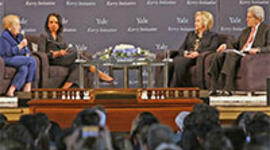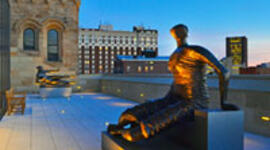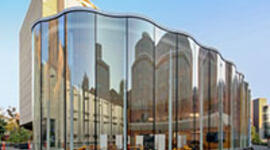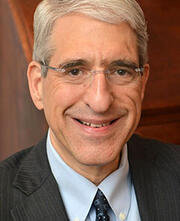Across our campus, we are emphasizing Yale’s commitment to sciences and engineering to spark discoveries that can improve lives. Our strategy is targeted and reflects some of Yale’s particular research strengths from Science Hill to the School of Medicine, from central campus to the West Campus. As you recall, we especially are focused on five multidisciplinary areas (as well as a number of other cross-cutting initiatives) where Yale can build on excellence, enhance our global reputation, and have outsized impact: data science and computer science; neuroscience; inflammation science; planetary solutions; and quantum science, engineering, and materials.
Data science and computer science
The COVID-19 pandemic demonstrates the importance of big data, computational tools, and other mathematical and technological developments in monitoring the spread and effects of disease. Of course, this priority area extends well beyond medicine and public health. It touches nearly every discipline and can benefit research throughout our campus. We are expanding data science and computer science in their applications, and we are advancing fundamental research underlying these areas too. This year, we are moving forward with the Kline Tower project, which had been put on hold in the spring due to the pandemic. We will create a state-of-the-art building that will transform the pursuit of data science, statistics, mathematics, and astronomy at Yale. We will begin interior demolition this month and complete the project by 2023.
Neuroscience
Yale has extraordinary strengths in neuroscience across many departments, programs, and schools. We are leveraging our faculty’s diverse expertise and research foci to expand the frontiers of knowledge, from molecular and cellular neuroscience to organismal cognition and behavior. We are advancing our understanding of the human mind, including how it functions and how it can be repaired. This academic year, we will finalize plans for a neuroscience institute at 100 College Street. Many faculty members who work in neuroscience and related fields from various disciplines will move into this new space in summer 2022.
Inflammation science
Inflammation science is vital to understanding our immune system as well as the cause and role of inflammation in many illnesses, including COVID-19, arthritis, cancer, depression, and multiple sclerosis. Yale has preeminent investigators working across the basic, translational, and clinical sciences to study inflammation and apply these discoveries to preventing, treating, and curing diseases. This year, Provost Scott Strobel and School of Medicine Dean Nancy Brown will work with colleagues across campus to develop ways to bring together multidisciplinary teams of faculty members to accelerate work that offers insights into the underlying causes of inflammation and its role in a wide range of conditions.
Planetary solutions
People around the globe are experiencing the clearly evident effects of climate change: forest fires across the western United States, a heat wave in Siberia, record high temperatures in the Arctic, and increasingly stronger hurricanes forming over the Atlantic Ocean. Climate change is a longstanding threat to humanity, and we must remain focused on creating solutions for this crisis. Yale’s Planetary Solutions Project addresses climate change and the evolutionary response to it. This is an area of focus throughout the university—from the School of Architecture to the School of the Environment, from economics to sociology and throughout the Faculty of Arts and Sciences. Later this semester, Provost Strobel will convene faculty members—in the arts, humanities, social sciences, sciences, and engineering—who work on projects related to Planetary Solutions, at various levels of analysis, from basic science to public policy. He will work with colleagues to implement a strategy to draw on research and scholarship across our campus to address the threats to our local and global environment.
Quantum science, engineering, and materials
Investments in this exciting area augment Yale’s indisputable leadership in quantum research, which could revolutionize technological developments across every sector. The Department of Energy recently selected Yale faculty members to lead the Co-design Center for Quantum Advantage, and Yale is one of the few universities that has a faculty member on the National Quantum Initiative Advisory Committee. These tremendous honors recognize our university’s preeminence in quantum science and computing. We are committed to building on this strength for Yale and the country. We are currently planning a physical sciences and engineering building to house quantum science, engineering, and materials research groups and many others in related fields on Science Hill.
Since my last update, more investigators and students have moved into the Yale Science Building, a major milestone in the university’s historic push in research, on Science Hill. Already, this facility houses thirty research groups conducting studies and forming new collaborations to answer questions about viruses, neural networks, genetic coding, insect behavior, environmental and climate stresses on plants, among many areas of investigation. Their work, which intersects with several priority areas, provides vital information about biological processes and the environment.




